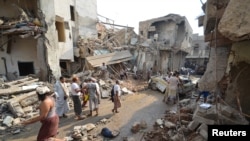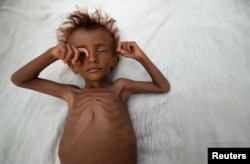The World Health Organization warns that war-torn Yemen is facing the threat of a cholera epidemic. The WHO is urgently appealing for $22.35 million to prevent the deadly disease from spreading throughout the country.
The World Health Organization reports 340 suspected cases of acute watery diarrhea. It says 18 of the cases are confirmed to be cholera. WHO Spokeswoman Fadela Chaib says fortunately, none of the sick have died.
“Thanks to our local staff and NGOs [non-governmental organizations] working on the ground, we were able to catch the first cases of cholera and to be able to respond partially, said Chaib. "But, without more generosity from the international community, we may see more cases of cholera spreading in the country — in a country where the health system is really in a very bad situation.”
The WHO reports more than 7.6 million Yemenis are living in areas affected by acute watery diarrhea and cholera. It warns more than three million people displaced by the war are especially vulnerable to the outbreak.
Chaib says peoples’ ability to fight off disease is low because food shortages have sapped them of energy and increased malnutrition.
“As a result of the ongoing conflict, two thirds of Yemenis do not have access to clean water and sanitation services, especially in cities, further increasing the risk of catching cholera, said Chaib. "This is further aggravated by a decline in the national health system’s capacity to respond to the cholera outbreak due to critical shortages in resources.”
WHO reports less than half of Yemen’s health facilities are functional due to shortages in health staff, medicine and medical supplies. A United Nations-brokered 72-hour cease-fire is supposed to go into effect in Yemen Wednesday, subject to renewal.
The World Health Organization and other aid agencies hope the break in the fighting will allow them to import food, medicine, fuel and other basic and emergency relief supplies into Yemen.





